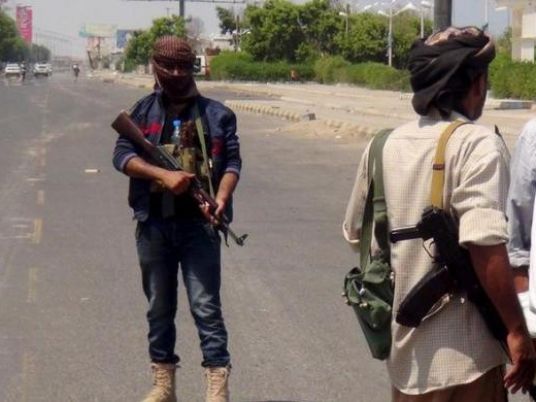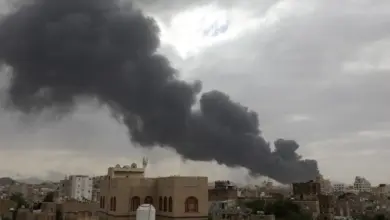
Houthi forces pulled back from a central Aden district on Friday and warplanes from the Saudi-led coalition dropped weapons and medical aid to fighters defending the southern Yemeni city, a last symbolic foothold of the country's absent president.
The Shi'ite Houthi fighters and their allies withdrew from Crater neighborhood as well as one of Aden's presidential residences which they seized a day earlier, residents and a local official said.
Their withdrawal followed overnight clashes and an air strike on the presidential palace at Ma'ashiq, overlooking Crater. At least one Houthi tank was destroyed and another taken over by President Abd-Rabbu Mansour Hadi's loyalists, they said.
Saudi Arabia's military intervention is the latest front in the Sunni Muslim kingdom's widening contest with Shi'ite Iran for power in the region, a proxy struggle also playing out in Syria, Iraq and Lebanon.
The Iranian-allied Houthis, fighting alongside soldiers loyal to former president Ali Abdullah Saleh, emerged as the strongest force in Yemen after they took over the capital Sanaa in September.
Last month they advanced on Aden, where Hadi had retreated, prompting the response from Riyadh. Nine days of Saudi-led air strikes have destroyed much of their equipment and cut off any chance of outside reinforcement, but failed to halt their march on the port city.
Aden residents said the streets of Crater neighborhood, deserted on Thursday after the Houthis swept in, were busy again on Friday after the attackers pulled back to the adjacent district of Khor Maksar.
Early on Friday warplanes from the coalition dropped crates of weapons and medical supplies by parachute over Tawahi, a district on the far end of the Aden peninsula which is still held by Hadi loyalists, fighters told Reuters.
The crates included light weapons, telecommunications equipment and rocket-propelled grenades, they said. The pro-Hadi newspaper Aden al-Ghad published pictures of at least one wooden crate attached to a parachute, which it said had landed in Aden. Local men were seen loading the crates onto pickup trucks.
Hadi fled Aden last week and has watched from neighboring Saudi Arabia as the vestiges of his authority on the ground have eroded as the Houthis advanced.
The coalition, which is trying to reassert Hadi's authority as a prelude to political negotiations, has repeatedly said that sending ground troops into Yemen remains an option but not an automatic move.
Officials have declined to say whether special forces have already deployed. Saudi ambassador to Washington Adel al-Jubeir said on Thursday the kingdom does not have "formal" troops on the ground in Aden.
Tribal sources in Yemen said on Friday that Saudi Arabia had started to remove parts of a fence along its border with the northwestern Yemeni provinces of Saada and Hajja.
This could be a prelude to an incursion by ground troops, but may also be part of more modest efforts to secure the frontier area, which on some stretches includes a buffer zone between the two countries.
US government sources said on Thursday that, although Washington believes Saudi Arabia and its allies have deployed a military force along the border which is large enough to launch a full-scale invasion, there was no indication that Riyadh was planning any such invasion soon.
Yemen's many conflicts
The war on the Houthis is now the biggest of several conflicts being fought out in Yemen, which is also grappling with a southern secessionist movement, tribal unrest and a powerful regional wing of al Qaeda.
The fighting forced Washington to evacuate personnel from the country, a main battlefield in its drone war against al Qaeda – although a US military officer said he believed Al Qaeda in the Arabian Peninsula was now more focused on addressing the Houthi offensive than plotting attacks abroad.
Suspected al Qaeda fighters stormed a jail in Yemen's Arabian Sea city of Mukalla on Thursday, freeing at least 150 prisoners including a prominent local leader of the global jihadi movement, Khaled Batarfi, residents said.
The Sunni Islamist al Qaeda fighters are viscerally opposed to the Houthis, who are drawn from a Zaidi Shi'ite minority that ruled a thousand-year kingdom in northern Yemen until 1962.
Saleh himself is a member of the sect but fought to crush the Houthis as president. Huge street demonstrations in 2011 linked to wider Arab uprisings forced him to step down, but he has re-emerged as an influential force by allying himself with the Houthis, his former enemies.
The civil war in Yemen has forced many countries to evacuate their citizens. China, which had already pulled its nationals out of Yemen, sent a frigate on Thursday to rescue 255 people from 10 different countries from Aden.
This was the first time that China's military has helped other countries evacuate their people during an international crisis.
Turkey said on Friday a naval frigate had evacuated 55 Turkish citizens from Aden. Foreign Minister Mevlut Cavusoglu said Ankara could give logistical and intelligence support, but that it wanted to see a political solution.
Saudi Arabia says it has support from four other Gulf Arab states as well as Egypt, Morocco, Jordan, Sudan and Pakistan, though it has not spelt out the support they have provided.



